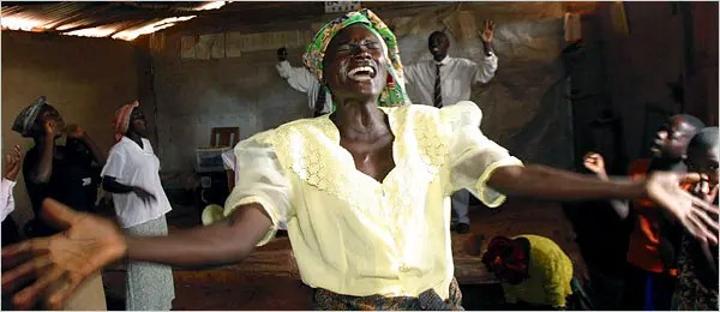Africa-Press – Zambia. The subject of speaking in tongues is perhaps one of the most misunderstood and controversial topics found in the Bible and has generated no small controversy around it in many Christian circles, a clear sign that there still remains a lot of unanswered questions in the minds of sincere seekers: Is tongues really the evidence of Holy Spirit baptism? Is it meant for every born-again Christian? Or have genuine tongues ceased?
The Daily Nation Lifestyle recently caught up with renowned men and women of the cloth and youth mentors to discuss this difficult topic; of speaking in tongues. Those that took part are Bishop Kamsisi Banda, overseer at Bethel Church of Zambia, Snr. Prophet/Pastor Emmanuel Tsalach Mutale from Spirit Sword Embassy Ministries, and a Children/Youth mentor Mr. Kasumbalesa Lawrence from the International Christian Assembly (ICA) of Moscow, Russia.
DAILY NATION LIFESTYLE: If we read Acts 2:1-12 we will find that the tongues spoken by the apostles were actual human languages, which were understood by those who heard them. Can you clarify for us what is meant by “tongues?”
Bishop Kamsis: Tongues are the speaking or uttering of an unknown language which could be of Angels or Men as the Holy Spirit gives you ability. Acts 2:1-13; 1 Corinthians 13:1-3
Kasumbalesa: First, it’s critical to recognize that when the Bible uses the term “tongue,” it refers to normal, spoken language (e.g., English, Spanish, French, etc.). The word tongue does not mean a strange, non-human sound or utterance. A “tongue” is a real, understandable human language, and therefore the spiritual gift of speaking in tongues always involves speaking a real, human language, complete with syntax, vocabulary, and sentence structure. The miracle of that moment was Galileans spoke foreign languages they did not know or even understand. Importantly, notice that visitors from those foreign regions could understand the speech, because it was a true language. The Galileans were NOT speaking in gibberish or made-up babbling. They were speaking in a true human language as evidenced by the fact that some in the crowd could understand them naturally. The Galileans spoke in foreign languages they didn’t previously know, which is the miracle of tongues.
Prophet Emmanuel: Tongues are heavenly language. You need to understand that the mouth speaks what the spirit says.
DN: What was the purpose of speaking in tongues back then and what is the purpose today?
Bishop Kamsis: Well, the purpose of tongues has not changed, as it was before so it is even now. There are two well-known purposes: The first one is for personal edification mainly, unless when interpreted can also be for the edification of others (church). 1 Corinthians 14:1-33. The second one is to build yourself up in the faith as you pray in tongues. Jude 1:20
Kasumbalesa: We can see this important principle about tongues evidenced in Acts 2, when thousands of new Jewish Christians began to speak in unknown tongues at Pentecost. In Acts 2:4-8 we see plainly that these “tongues” were normal, human languages that many foreigners in the crowd could understand naturally.
DN: Some say it is just fake and is not inspired by the Holy Spirit or by God. And 1 Corinthians 12:10 says the Holy Spirit gifts some with tongues and others with interpretation. Many people have found it so weird that a lot of Christians today speak in tongues, but till today they have not met one person that can interpret the tongues. If the speaking in tongues is genuine, Where are the interpreters?
Bishop Kamsisi: I cannot conclude that all who speak in tongues are fake, no. The Bible advises us to pray for the interpretation of tongues; else the speaker should use them when alone to pray to God if they can’t be interpreted by those around. 1 Corinthians 14:27-28
DN: What does the Bible say about the tongues spoken by most Pentecostals today?
Bishop Kamsis: As I said earlier, the purpose of tongues has not changed, as it was before so it is even now. The purpose of tongues and/or what the Bible says about tongues has not changed over time. Even the Pentecostals of today, are supposed to apply the same principles or teachings about tongues that are in the Bible.
Prophet Emmanuel: One of the best examples of speaking in tongues is in Matthew 27:45 when Jesus was on the cross. The Bible says he cried out loudly, Eli, Eli, lema sabachthani?” to mean, “My God, My God, why have you forsaken me?” The Bible says some of the people, put in mind the word ‘some’ who were standing there heard what he said but misinterpreted it that Jesus was calling out for Elijah when In fact he was calling out to God, the father. The fact that the word ‘some’ was used in this verse, I believe that around that place there were some people who understood what Jesus had said. And just like it was during that time, this can be said of today’s speaking in tongues. When you get connected, and the spirit is ready to get connected, you will be able to understand the chanting (tongues). You will be able to relate to what is being said. The same chanting/tongues is a language that can be understood spiritually. The spirit prays what the mouth speaks.
Kasumbalesa: Acts 2:4-8, explains it more clearly. A “tongue” is real, normal, natural, recognizable, and understandable spoken human language, and therefore the Spiritual gift of speaking in tongues always involves speaking a real, human language, complete with syntax, vocabulary and sentence structure. It does not require a strange, non-human sound or utterance.
DN: Despite the biblical command, tongue-speakers never have interpreters in today’s Charismatic or Pentecostal worship. Would you agree that speaking in tongues has been abused so much in the Christian community because it’s so easy to fake?
Bishop Kamsis: Yes; tongues can be faked and have been faked and abused just like other spiritual gifts. This is why our Lord Jesus Christ one day said that His servants would be known by their fruits and not gifts. Mathew 7:15-20. But I cannot conclude that all who speak in tongues are fake, no. The Bible advises us to pray for the interpretation of tongues; else the speaker should use them when alone to pray to God if they can’t be interpreted by those around. 1 Corinthians 14:27-28
Emmanuel: I love the word ‘fake’ but how would you know that something is fake if you don’t know the original one? Spiritual tongues are by faith. For me speaking in tongues depends on the doctrine. You can only say it’s fake if you have the original copy. For he who speaks in tongues should pray to God to help them interpret what they are saying.
Kasumbalesa: For me, this is why the gift of tongues should never involve just making gibberish sounds or chanting repetitive phrases or nonsense words. I believe a person with the gift to speak in tongues will suddenly begin speaking in a recognizable, human language that the person did not previously know and cannot understand. If that foreign tongue is spoken in the presence of a person who knows that language naturally, then he or she will immediately understand the speech because it is a natural language. If an English-speaking Christian with the gift of tongues is prompted by the Spirit to speak in Spanish, then this person will not understand his or her own speech, which is the essence of the miracle. Nevertheless, anyone who knows the Spanish language could understand the speech perfectly.
Prophet Emmanuel: As I mentioned earlier, tongues are heavenly languages. The interpretation of the tongues is within us. The Holy Spirit has given us the ability to interpret what we are saying. Also, there is a 100 percent possibility that when one speaks in tongues, the other can interpret. Of course, that can be a gift of interpretation of tongues. Even the person speaking in tongues can interpret.
DN: From my end, I see prayer as a contract. I mean you say ‘yes’ (amen) to what you have understood, but it seems it’s way more difficult to fake interpretation so, many churches now emphasize speaking. Would you sign a ‘supposed’ life-changing contract in a foreign language that you can’t understand without an Interpreter present? Why should people be made to say ‘Amen’ to what is being prayed in tongues when it’s not being interpreted?
Bishop Kamsis: It is improper for one to involve others when speaking in tongues where there is no interpretation. If you pray in tongues among the people, say Amen to God on your own. You need to know that it is you and God in that because even your understanding (mind) is not involved. The only prayers we can involve all the other people gathered into saying AMEN together are those prayed in languages that all understand.
DN: Some suggest that the confusion of tongues at Babel in Genesis 11 is “reversed” through tongues breaking the language barrier in Acts 2. In your understanding, does speaking in tongues have anything to do with reversing the judgment of tongues in Genesis 11?
Bishop Kamsis: At Babel, there was born a confusion of languages so that men could not understand each other and at Pentecost, the Apostles spoke in tongues of men of different languages and so the Bible records that all that were present could hear what they said. This record may indeed show that God was reversing the Babel situation, though it is not specifically mentioned or explained in the Bible that it is so.
For More News And Analysis About Zambia Follow Africa-Press







